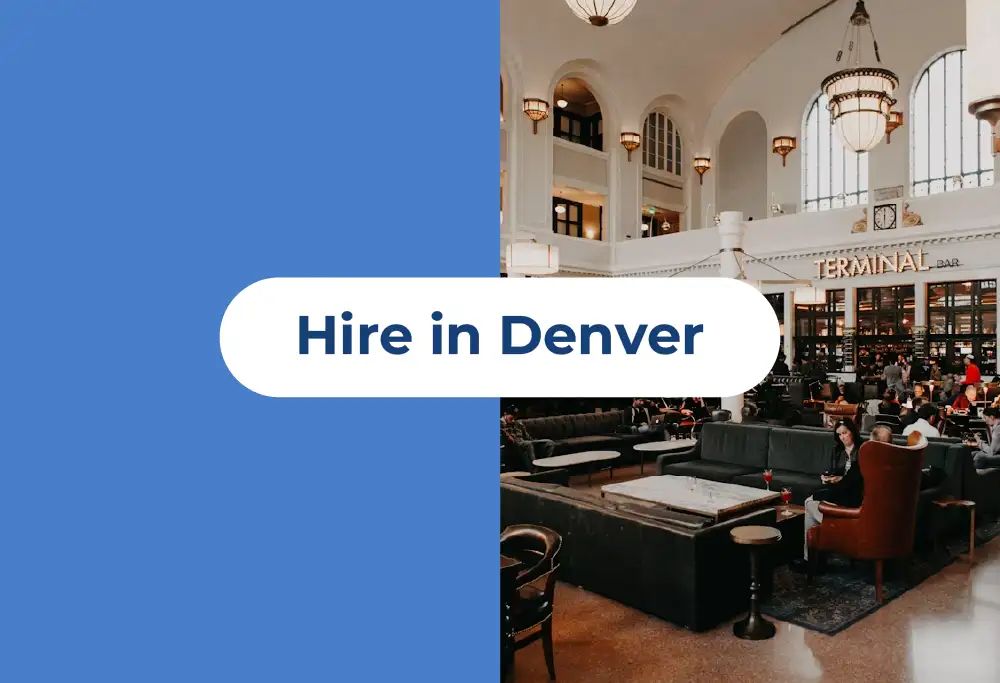Denver, the capital of Colorado, has emerged as one of the most dynamic and rapidly growing cities in the United States. Known as the “Mile High City,” Denver sits at the base of the Rocky Mountains and combines natural beauty with a thriving business environment.
In recent years, it has become a hub for industries such as technology, aerospace, renewable energy, finance, and healthcare.
With a population that continues to expand and a highly educated workforce supported by universities like the University of Colorado and the Colorado School of Mines, Denver offers exceptional opportunities for companies looking to hire in 2025. Its lower cost of living compared to coastal hubs and its reputation as an innovation-driven city make it especially appealing to both employers and employees.
This guide explores everything companies need to know about hiring in Denver in 2025, from compliance and taxation to recruitment strategies and employee benefits.
How to Hire in Denver Easily in 2025
Employers entering the Denver market have two main options:
- Setting up a U.S. entity in Colorado, registering with local and federal authorities, and managing HR, payroll, and compliance directly.
- Partnering with an Employer of Record (EOR), which enables companies to hire talent in Denver without incorporating locally. The EOR handles payroll, benefits, contracts, and compliance while the business directs the employee’s daily work.
To hire in Denver successfully, companies need to:
- Draft job descriptions aligned with Colorado’s competitive labor market.
- Register for employer taxes at federal and state levels.
- Understand Colorado-specific labor laws, including paid leave policies.
- Provide competitive benefits packages to attract top talent in Denver’s growing industries.
- Leverage universities, job boards, and professional associations to access the local talent pool.
Why Hire in Denver? The Benefits of Hiring in Denver
Strategic Location
Denver is strategically positioned in the center of the United States, making it a key hub for national transportation and logistics. Its international airport, Denver International Airport (DEN), is one of the largest and busiest in the country, offering strong domestic and international connectivity. For businesses, Denver’s central location allows for efficient distribution across both coasts and international markets.
Growing and Educated Workforce
The Denver metro area continues to experience significant population growth, fueled by migration from other U.S. regions.
The city benefits from a young, highly educated workforce, with institutions like the University of Colorado, Colorado State University, and the Colorado School of Mines producing graduates in engineering, business, energy, and healthcare.
Diverse and Resilient Economy
Denver’s economy spans multiple sectors, including technology, aerospace, energy, healthcare, financial services, and outdoor recreation. This economic diversity creates resilience and makes Denver attractive for employers across a wide range of industries.
Balanced Cost of Living
While Denver’s cost of living has risen in recent years, it remains lower than coastal hubs such as San Francisco, New York, and Los Angeles. This allows employers to recruit talent with competitive packages while keeping operating expenses under control.
Legal Requirements for Hiring Employees in Denver
Employers in Denver must comply with federal labor laws and Colorado’s state-specific employment regulations.
Employment Contracts
Colorado is an “at-will” employment state, meaning that either the employer or the employee can end the relationship at any time without cause, provided that the termination is not discriminatory or retaliatory. Written contracts are not required but are recommended to clarify compensation, benefits, and job duties.
Working Hours and Overtime
The standard workweek in Denver is 40 hours. Under the Fair Labor Standards Act (FLSA) and Colorado state law, non-exempt employees must be paid 1.5 times their hourly rate for hours worked beyond 40 per week or 12 per day. Colorado also enforces additional break and meal requirements.
Probation Periods
Probationary periods are not mandated in Colorado but are widely used, often lasting 90 days, giving both employers and employees the opportunity to evaluate the employment relationship.
Termination of Employment
As an at-will state, Colorado permits employers to terminate employees without cause, provided it does not violate anti-discrimination laws or contractual terms. Severance pay is not legally required but is sometimes offered, particularly for senior roles.
Taxation and Social Security Contributions in Denver
Employers hiring in Denver must comply with both federal and state payroll tax requirements.
1. Individual Income Tax (IIT)
Colorado imposes a flat state income tax rate of 4.4% (2025). Employees must also pay federal income tax, which ranges from 10% to 37% depending on earnings. Employers are responsible for withholding both state and federal taxes.
2. Employer Contributions to Social Insurance
Employers in Denver contribute to the following programs:
- Social Security: 6.2% of employee wages (matched by employees).
- Medicare: 1.45% of wages (matched by employees).
- Federal Unemployment Tax (FUTA): 0.6% of the first $7,000 in wages after credits.
- Colorado State Unemployment Insurance (SUI): Employer rates vary based on industry and claims history.
- Paid Family and Medical Leave Insurance (FAMLI): Colorado requires shared contributions between employers and employees to fund family and medical leave benefits.
3. Contribution Bases
Social Security contributions are capped at the annual federal wage base (about $168,600 in 2025). Medicare contributions have no cap, though high earners must pay an additional 0.9% surtax on wages above $200,000.
Work Permits and Other Requirements for Hiring Foreign Workers in Denver
Denver’s reputation as a growing hub for aerospace, technology, and healthcare attracts many international professionals. Employers hiring non-U.S. citizens must follow U.S. immigration procedures.
- Visa Sponsorship: Employers often sponsor H-1B visas (specialty occupations), L-1 visas (intra-company transfers), and O-1 visas (extraordinary ability). Sponsorship requires proving that the role cannot easily be filled by local candidates.
- Labor Condition Application (LCA): Certain visas require filing an LCA with the U.S. Department of Labor to ensure fair wages and workplace protections.
- E-Verify: Many Colorado employers use this federal system to confirm the employment eligibility of new hires.
- Medical and Background Checks: Some visas require employees to undergo health checks and background verification.
Current Trends and Top Recruitment Strategies in Denver
Denver’s labor market continues to evolve rapidly. To stay competitive, employers are adopting new strategies.
- University Partnerships: Employers collaborate with the University of Colorado, Colorado State University, and the Colorado School of Mines to recruit graduates in engineering, IT, and healthcare.
- Focus on Aerospace and Energy: Denver’s position as a hub for aerospace and renewable energy industries is creating high demand for skilled professionals. Employers in these fields should emphasize innovation and sustainability.
- Healthcare Growth: The city’s growing population fuels demand for healthcare professionals. Employers should highlight stability and opportunities for advancement.
- Diversity and Inclusion: Denver’s workforce is increasingly diverse, and inclusive hiring practices are vital for attracting top candidates.
- Hybrid and Remote Work Models: Flexible work arrangements remain popular in Denver, with many professionals seeking balance between urban work opportunities and outdoor lifestyle benefits.
Hiring Skilled Workers vs. Entry-Level Talent in Denver
Hiring Skilled Workers
Denver’s skilled professionals in aerospace, technology, healthcare, and energy expect comprehensive benefits, career progression, and opportunities for professional development. Employers must focus on innovation and leadership opportunities to compete with established industry players.
Hiring Entry-Level Talent
With a strong university network, Denver produces many entry-level candidates each year. To attract this talent, companies should emphasize mentorship, internships, training programs, and clear career paths. Early engagement with students through career fairs and partnerships is also effective.
Competitive Benefits in Denver
In Denver’s competitive market, benefits packages are often a key differentiator. Common offerings include:
- Health, dental, and vision insurance
- 401(k) retirement plans with employer contributions
- Paid family and medical leave (aligned with Colorado’s FAMLI program)
- Paid vacation and sick leave
- Tuition reimbursement and professional training opportunities
- Wellness programs, including outdoor activity incentives and mental health support
- Hybrid or remote work arrangements
Hiring Solutions for Foreign Companies in Denver
Foreign businesses seeking to hire in Denver have three main options:
Independent Contractors: Hiring contractors is flexible but requires strict compliance with IRS and Colorado classification rules to avoid misclassification issues.
Establishing a U.S. Entity: Creating a Colorado entity provides full control but requires significant time, resources, and compliance with state incorporation and tax regulations.
Employer of Record (EOR): The fastest and most efficient option. An EOR manages payroll, contracts, benefits, and compliance while the company oversees the employee’s daily work. This allows businesses to hire in Denver without establishing a local entity.
Trust INS Global to Hire in Denver Today
Denver has grown into one of the most promising cities in the United States for hiring in 2025. With its strategic location, diverse economy, educated workforce, and balanced cost of living, the Mile High City offers opportunities across technology, aerospace, healthcare, and energy industries.
At the same time, navigating federal and Colorado-specific employment laws, tax obligations, and visa requirements can be challenging for international businesses. That’s where INS Global can help.
Our Employer of Record (EOR) services in Denver simplify the hiring process, ensuring compliance while allowing your company to expand quickly and confidently.



SHARE